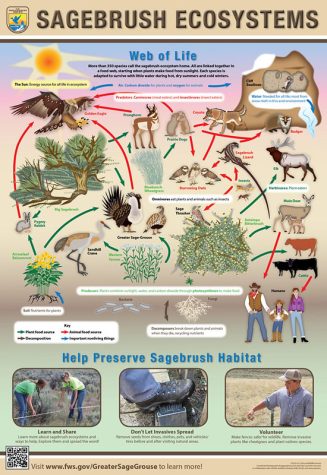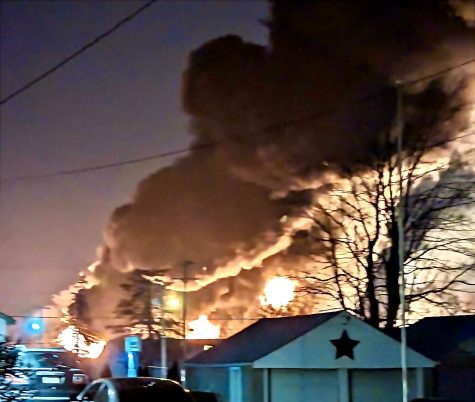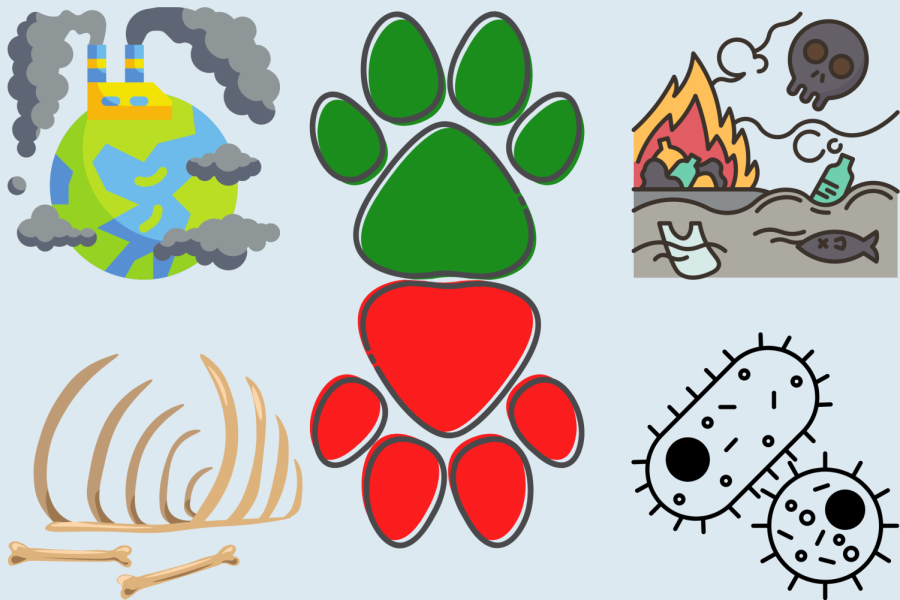Animals Play a Crucial Role in The Survival of The Human Species
The image serves as a representation of what dangers are to come to the environment. Some include toxic waste overflowing the ocean, mass extinction, great amounts of greenhouse gasses and tons of dangerous bacteria.
Since the start of mankind, human beings have grown dependent on the presence of animals. Today, this may come in forms of nutrition, companionship or simply to serve as the earth’s “ground-keepers.” Yet since the Industrial Revolution, animals have been set on the backburner to put human needs ahead.
Some examples include the mass killings from slaughterhouses and the fishing industry, carbon emissions that degrade countless habitats and growing pollution levels that toxify the air, land and sea. Thus far, there have been five mass extinctions known in earth’s history and it is predicted by scientists that the next one is right around the corner – this time by means of human interference. Desperate action needs to be taken as the entire planet is depending on it.

The extinction of a species, especially one not widely known, may be passed by as unimportant. Though what is not realized is the impact each individual species contributes to maintaining the natural balance of functional life. This does not solely apply to direct producers such as worms and coral but also to creatures responsible for feeding those higher up on the food chain.
Biomedical Science/Interventions and Biology teacher Juli Bachman shares insight on what environmental effects may come with the removal of just a single species.
“If we were to remove a few or even one species, the rest of the food web would be negatively affected, including humans,” Bachman stated. “Animals breathe out carbon dioxide, which plants require, and when they die, they decay and create the material necessary for our soils to thrive.”
The fear of endangerment has not only targeted animals directly killed by humans in the fishing and slaughterhouse industries, but has also stemmed from many indirect instances of environmental destruction such as the recent Ohio train derailment. The train spilled tons of toxic chemicals into nearby habitats and, most concerningly, the atmosphere. Unlike canals and forests to which have “break off” points that narrow down the extent to which they spread, the atmosphere can transfer chemicals to nearly any part of the world from a single disastrous event like this recent spillage.
With the extinction of certain animals comes serious repercussions as adaptable species like many weeds and pests could expand their ranges without facing interference. As large quantities of invasive species spread across the globe, numerous dangers will follow; at the top of the list is harmful bacteria. Having the ability to infiltrate immune systems and cause infections, these bacteria are the main culprit for disease-inflicted deaths in poorer areas around the world.
Yes, a good amount of bacteria can cause serious harm to all the creatures living in their presence, but there are just as many that can bring positive results too.
“There are anywhere from 700 to 1,000 different species of bacteria residing in the human gut and without them, we could not digest our food or manufacture vitamins for our bodies,” environmental activist Paul Watson said in an OutdoorJournal blog post.
As for pollution, plastic and garbage waste has caught and filled the stomachs of millions-upon-millions of fish and bird species. Pollution is one of the main culprits behind the climate crisis, as burning plastics and greenhouse gasses have proven to be highly toxic for the atmosphere. People can assist on a smaller scale by taking just a few simple steps — check out this article to find out more about reducing, reusing and recycling.

When the COVID-19 pandemic began, many felt an emptiness inside, deprived of necessary human interaction. This was the main reason for the dramatic spike in domesticated pet populations, whether dogs, cats, fish, hamsters or iguanas. Domesticated animals have brought companionship to humans for thousands of years, emitting love into the homes of millions, which is the sole reason why all animals should be treated with a similar respect.
Animals keep the environment healthy, provide companionship to many in need and have guided this world through a list of catastrophic events. This only proves how crucial each and every one of their roles are, not just for the survival of the human species, but the entire planet.
Being an advocate for veganism, climate change and ending plastic waste has taught me how utterly valuable animals and the environment are in protecting this earth from reaching a near end. If there is any action you can make towards saving these precious creatures, do it, as there is no greater time to follow a more environmental path than now.
With a similar goal in mind, Bachman shares one final remark on how important animals really are.
“A lot of humans eat animals as a food source, they are a vital part of the food web, and have also been used to help humans with tasks such as farming and bringing us joy and comfort as pets,” Bachman said. “I have two dachshunds, Watson & Bernard, and my life is so much better with them in it!”


